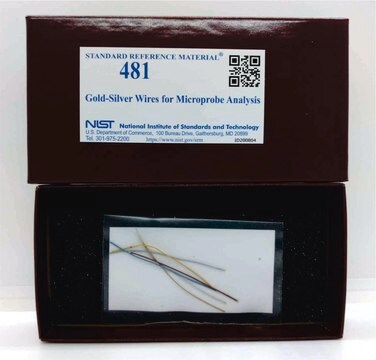349283
Gold
wire, diam. 0.1 mm, 99.99% trace metals basis
Synonyme(s) :
Gold Powder, Gold black, Gold element
Se connecterpour consulter vos tarifs contractuels et ceux de votre entreprise/organisme
About This Item
Formule empirique (notation de Hill):
Au
Numéro CAS:
Poids moléculaire :
196.97
Numéro CE :
Numéro MDL:
Code UNSPSC :
12141717
ID de substance PubChem :
Nomenclature NACRES :
NA.23
Produits recommandés
Pureté
99.99% trace metals basis
Forme
wire
Résistivité
2.05 μΩ-cm, 0°C
Diamètre
0.1 mm
Point d'ébullition
2808 °C (lit.)
Pf
1063 °C (lit.)
Densité
19.3 g/mL at 25 °C (lit.)
Chaîne SMILES
[Au]
InChI
1S/Au
Clé InChI
PCHJSUWPFVWCPO-UHFFFAOYSA-N
Application
Gold wires can be used for a variety of applications such as a probe for tip enhanced near-field optical microscopy (TENOM) which can further be used in the detection of fluorescence or Raman emission and as a probe that facilitates the electrical conductivity of the metallic composites.
Quantité
150 mg = 1 m; 750 mg = 5 m
Code de la classe de stockage
11 - Combustible Solids
Classe de danger pour l'eau (WGK)
nwg
Point d'éclair (°F)
Not applicable
Point d'éclair (°C)
Not applicable
Équipement de protection individuelle
Eyeshields, Gloves, type N95 (US)
Faites votre choix parmi les versions les plus récentes :
Déjà en possession de ce produit ?
Retrouvez la documentation relative aux produits que vous avez récemment achetés dans la Bibliothèque de documents.
Les clients ont également consulté
Stretchable gold conductors on elastomeric substrates
Lacour S, et al.
Applied Physics Letters, 82(15), 2404-2406 (2003)
Apertureless near-field/far-field CW two-photon microscope for biological and material imaging and spectroscopic applications
Nowak DB, et al.
Applied Optics, 49(35), 6766-6771 (2010)
Enhanced image contrast with delocalized near-field excitation
Sanchez E, et al.
Crystal Research and Technology, 49(9), 681-689 (2014)
Tianxun Gong et al.
Journal of biomedical nanotechnology, 9(6), 985-991 (2013-07-19)
In this paper, we proposed the use of gold nanoparticles as plasmon scattering probes for dark-field multiplex imaging of live cancer cells. By carefully engineering the surfaces, aqueous dispersions of anti-EGFR antibody-conjugated gold nanospheres and gold nanorods are prepared. We
Tae-Sik Cho et al.
Journal of nanoscience and nanotechnology, 13(5), 3711-3714 (2013-07-19)
The crystallization of Au/glass ultrathin films for surface plasmon resonance (SPR) biosensor has been studied using synchrotron X-ray scattering and field emission scanning electron microscope. In films thinner than 30 nm, crystallized Au grains with [111] preferred orientation were formed
Notre équipe de scientifiques dispose d'une expérience dans tous les secteurs de la recherche, notamment en sciences de la vie, science des matériaux, synthèse chimique, chromatographie, analyse et dans de nombreux autres domaines..
Contacter notre Service technique

